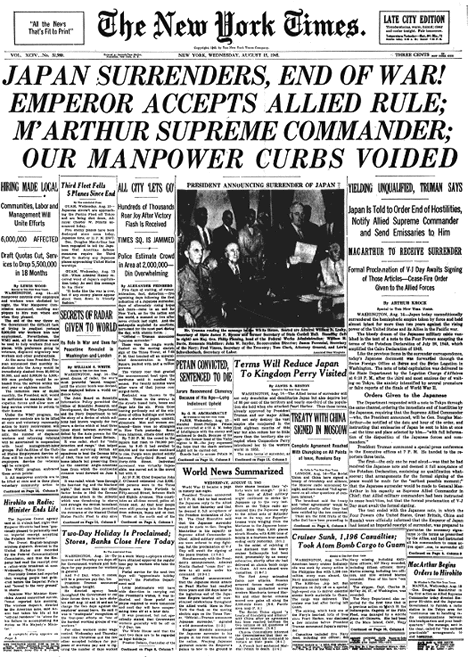| Tweet |

http://ameblo.jp/warm-heart/entry-10127571248.html から転載。 2008-08-15 13:11:51 http://www.nytimes.com/learning/general/onthisday/big/0814.html#article 「日本降伏、戦争終結!」の見出しでアジア太平洋戦争終結を報じる米ニューヨーク・タイムズ紙(1945年8月14日付) 無条件降伏し、天皇は連合国統治を受け入れる。戦闘行為の終結を命じ、マッカーサー連合国総司令官に特使を派遣する旨などが報じられている。 Japan Surrenders, End of War! Washington, Aug. 14 -- Japan today unconditionally surrendered the hemispheric empire taken by force and held almost intact for more than two years against the rising power of the United States and its Allies in the Pacific war. The bloody dream of the Japanese military caste vanished in the text of a note to the Four Powers accepting the terms of the Potsdam Declaration of July 26, 1945, which amplified the Cairo Declaration of 1943. Like the previous items in the surrender correspondence, today's Japanese document was forwarded through the Swiss Foreign Office at Berne and the Swiss Legation in Washington. The note of total capitulation was delivered to the State Department by the Legation Charge d'Affaires at 6:10 P. M., after the third and most anxious day of waiting on Tokyo, the anxiety intensified by several premature or false reports of the finale of World War II. Orders Given to the Japanese The Department responded with a note to Tokyo through the same channel, ordering the immediate end of hostilities by the Japanese, requiring that the Supreme Allied Commander- who, the President announced, will be Gen. Douglas MacArthur- be notified of the date and hour of the order, and instructing that emissaries of Japan be sent to him at once- at the time and place selected by him- "with full information of the disposition of the Japanese forces and commanders." President Truman summoned a special press conference in the Executive offices at 7 P.M. He handed to the reporters three texts. The first- the only one he read aloud- was that he had received the Japanese note and deemed it full acceptance of the Potsdam Declaration, containing no qualification whatsoever; that arrangements for the formal signing of the peace would be made for the "earliest possible moment;" that the Japanese surrender would be made to General MacArthur in his capacity as Supreme Allied Commander in Chief; that Allied military commanders had been instructed to cease hostilities, but that the formal proclamation of V. J. Day must await the formal signing. The text ended with the Japanese note in which the Four Powers (the United States, Great Britain, China, and Russia) were officially informed that the Emperor of Japan had issued an imperial rescript of surrender, was prepared to guarantee the necessary signatures to the terms as prescribed by the Allies, and had instructed all his commanders to cease active operations to surrender all arms and to disband all forces under their control and within their reach. The President's second announcement was that he had instructed the Selective Service to reduce the monthly military draft from 80,000 to 50,000 men, permitting a constant flow of replacements for the occupation forces and other necessary military units, with the draft held to low-age groups and first discharges given on the basis of long, arduous and faithful war service. He said he hoped to release 5,000,000 to 5,500,000 men in the subsequent year or eighteen months, the ratio governed in some degree by transportation facilities and the world situation. The President's final announcement was to decree holidays tomorrow and Thursday for all Federal workers, who, he said, were the "hardest working and perhaps the least appreciated" by the public of all who had helped to wage the war. Mr. Truman spoke calmly to the reporters, but when he had finished reading his face broke into a smile. Also present were Secretary of State James F. Byrnes and Admiral William D. Leahy, the President's personal Chief of Staff, and two other members of the Cabinet- Henry A. Wallace, Secretary of Commerce, and James V. Forrestal, Secretary of the Navy- managed to respond to a hurry call in time to be there. The agreement to issue the statements simultaneously in all the Allied capitals, and the brief period between the call to the Cabinet and the announcement, were responsible. Later the chief war administrators and Cordell Hull, former Secretary of State, arrived to congratulate the President. President Addresses Crowd After the press conference, while usually bored Washington launched upon a noisy victory demonstration, the President with Mrs. Truman walked out to the fountain in the White House grounds that face on Pennsylvania Avenue and made the V sign to the shouting crowds. But this did not satisfy the growing assemblage, or probably the President either, for, in response to clamor, he came back and made a speech from the north portico, in which he said that the present emergency was as great as that of Pearl Harbor Day and must and would be met in the same spirit. Later in the evening he appeared to the crowds and spoke again. He then returned to the executive mansion to begin work, at once on problems of peace, including domestic ones affecting reconversion, unemployment, wage-and-hour scales and industrial cut-backs, which are more complex and difficult than any he has faced and call for plans and measures that were necessarily held in abeyance by the exacting fact of war. But certain immediate steps to deal with these problems and restore peacetime conditions were taken or announced as follows: 1. The War Manpower Commission abolished all controls, effective immediately, creating a free labor market for the first time in three years. The commission also set up a plan to help displaced workers and veterans find jobs. 2. The Navy canceled nearly $6,000,000,000 of prime contracts. The Japanese offer to surrender, confirmed by the note received through Switzerland today, came in the week after the United States Air Forces obliterated Hiroshima with the first atomic bomb in history and the Union of Soviet Republics declared war on Japan. At the time the document was received in Washington, Russian armies were pushing back the Japanese armies in Asia and on Sukhalin Island, and the Army and Navy of the United States with their air forces- aided by the British- were relentlessly bombarding the home islands. When the President made his announcements tonight it was three years and 250 days after the bombing of Pearl Harbor, which put the United States at war with Japan. This was followed immediately by the declarations of war on this country by Germany and Italy, the other Axis partners, which engaged the United States in the global conflict that now, in its military phases, is wholly won. If the note had not come today the President was ready though reluctant to give the order that would have spread throughout Japan the hideous death and destruction that are the toll of the atomic bomb. Officially the Japanese note was a response to the communicator to Tokyo, written on behalf of the Allies Aug. 11 by Secretary Byrnes, which was itself a reply to a Japanese offer on Aug. 10 to surrender on the understanding of the Japanese Government that the Potsdam Declaration did not "prejudice the prerogatives" of the Emperor of Japan as its "sovereign ruler." Plan on the Emperor Mr. Byrnes wrote, in effect, that the Japanese might keep their Emperor if they chose to do so of their own free-will, but that he would be placed under the authority of the Allied Commander-in-Chief in Tokyo and would be responsible to that commander for his official and public activities. Relief rather than jubilation that the grim and costly task of conquering the Axis is done was the emotion of the officials, from the President down, who have traversed the long and agonizing road to victory since Dec. 7, 1941, when the Japanese attacked Pearl Harbor while Tokyo's "peace" envoys- Admiral Kichisahura Nomura and Ambassador Saburo Kurusu- were still continuing their negotiations with Secretary of State Hull. The road is piled high with the bodies of American soldiers, sailors, airmen and civilians who gave their lives that the victory might be attained. And, in a solemn hour of triumph, the men in Washington that were their military and civilian commanders could not be jubilant in the lasting memory of these human sacrifices. On the contrary, they seemed more than ever resolved to produce a system of world security which for a long time would obviate the necessity of such sacrifices to dictators and aggressive nations; and to impress on the Japanese- as on the Germans- their crimes, nor relax their punishments, until they learn to follow the ways of peace. Though the victory over the Japanese as well as the Nazis had always seemed assured to the American authorities, it did not become a certainty until the Allies- through United States invention and production, Allied military and scientific skills and the fortitude of the British, Chinese, Russian and American populations- were able to change from defense to attack. This change, so far as the Pacific was concerned, came after the Battle of Midway gathered force after the actions of the Coral Sea and the Philippines and came to crescendo with the captures of Saipan, Iwo Island and Okinawa, the perfection of radar and the discovery and use of the atomic bomb. But before these successes the story was very different. The Japanese attack on Pearl Harbor found the Pacific Fleet divided, half of it crowded in the roadstead, the other half dispatched for Atlantic service for reasons of policy. These reasons grew out of President Roosevelt's decision that the Nazi menace required the fleet diversion to the Atlantic for immediate national defense, and out of his belief that, as he expressed it, he could "baby along Japan." This latter view was the foundation of the underlying policy by which the United States continued to furnish Japan with scrap iron, petrol, ant other materials transferable to war uses long after Japan by many officials was conceded to be bent on hemispheric and eventual world-wide aggression.
gataro-cloneの投稿
「日本降伏、戦争終結!」【米ニューヨーク・タイムズ紙(1945年8月14日付)】
テーマ:戦争責任(歴史)

記事の詳細はこちら ⇒
-----------------------------------
Emperor Accepts Allied Rule
-----------------------------------
M'Arthur Supreme Commander
-----------------------------------
Yielding Unqualified, Says Truman
-----------------------------------
Japan Told to Order End of Hostilities, Notify Allied Supreme Commander and Send Emissaries to Him
-----------------------------------
MacArthur To Receive Surrender
-----------------------------------
Formal Proclamation of V-J Day Awaits Signing of Those Articles -- Cease-Fire Order Given to the Allied Forces
-----------------------------------
By ARTHUR KROCK
Special to THE NEW YORK TIMES
- Re: この記事は「どこへ行く、日本。」から削除しました。よって転載記事ではありません。 gataro 2008/8/15 19:06:24
(0)
投稿コメント全ログ コメント即時配信 スレ建て依頼 削除コメント確認方法
 題名には必ず「阿修羅さんへ」と記述してください。
題名には必ず「阿修羅さんへ」と記述してください。
掲示板,MLを含むこのサイトすべての
一切の引用、転載、リンクを許可いたします。確認メールは不要です。
引用元リンクを表示してください。